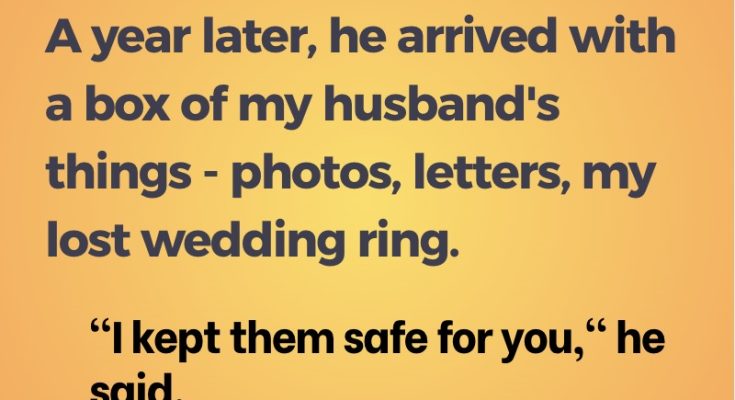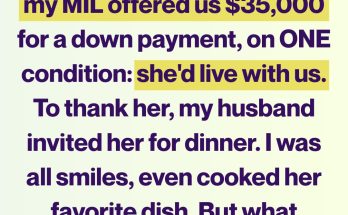Maybe I reminded him of everything he’d lost. Maybe he blamed me for some part of it. Whatever the reason, he vanished from my life after the funeral, and I let him.
The weeks turned into months, and the space between us became a canyon. He didn’t answer my calls. He ignored my messages.
Birthdays, holidays—he was nowhere to be found. And even though I told myself I understood, that he needed space to heal, it still cut deeper than I could admit. He wasn’t my son, not really.
Our bond was still young, fragile. And now, without my husband—the one who’d connected us—it felt like there was nothing left tying us together. Grief is a strange, suffocating thing.
It doesn’t just sit heavy in your chest; it seeps into every corner of your life. It was in the empty chair across from me at breakfast. It was in the quiet rooms where laughter used to echo.
And it was in the silence of my phone when I stared at his name, hoping for a message that never came. I mourned two people: the man I’d loved and built a life with, and the boy I’d hoped to love as my own. Their absences were different but equally unbearable.
And as the first anniversary of my husband’s death approached, I braced myself for another lonely year. Then, on a gray and rainy afternoon—one of those days where the world feels suspended in sorrow—the doorbell rang. I wasn’t expecting anyone.
For a moment, I thought it was a delivery. But when I opened the door, the sight before me knocked the breath from my lungs. There he was.
My stepson. He stood on the porch, soaked from the rain, a cardboard box cradled in his arms. He looked older somehow, like the year had aged him beyond his eighteen years.
His jaw was sharper, his posture more guarded. And yet, when our eyes met, I saw something achingly familiar—his father’s eyes staring back at me, soft and uncertain. “Hi,” he murmured, his voice rough around the edges.
Then, before I could find words, he stepped forward, placed the box carefully at my feet, and said, “I kept them safe for you.”
Then he turned as if to leave. “Wait,” I blurted, my voice trembling. “Please… come inside.”
For a moment, I thought he’d refuse.
But he nodded once, stepped over the threshold, and followed me into the house that had once been filled with shared meals and movie nights and laughter. Now, it was heavy with unspoken words. I set the box on the coffee table and lifted the lid with shaky hands.
Inside was a collection of memories—pieces of a life I thought I’d lost forever. On top were photographs, dozens of them, some I hadn’t seen in years. Pictures of my husband and me from our first trips together.
Candid snapshots from lazy Sunday mornings. Silly faces, tight hugs, eyes full of love. Beneath them were letters—folded and creased, written in my husband’s unmistakable handwriting.
Words of affection and gratitude, dreams for our future, promises we’d kept and some we hadn’t. And at the very bottom of the box, nestled in a small velvet pouch, was something I never thought I’d see again. My wedding ring.
I stared at it, my heart stuttering. I’d lost it the day we buried him. Somewhere between the tears and the goodbyes, it had slipped from my finger and vanished.
I’d searched for weeks before giving up, telling myself it didn’t matter—that a ring was just a symbol, and my love for him lived beyond that. But now, here it was, warm against my palm, like a heartbeat returning to life. I looked up at my stepson, my eyes wet with tears.
“You found it.”
He nodded, his expression unreadable. “I kept everything safe. I thought… you’d want them back when you were ready.”
A lump formed in my throat.
All this time, I’d believed he was avoiding me out of anger. But he hadn’t been running from me—he’d been holding on to pieces of our shared past, keeping them safe until the right moment. I sifted through the box again, overwhelmed by the flood of emotions.
That’s when his voice broke the silence. “I didn’t want you to know,” he said quietly, his hands stuffed into his pockets. “But after everything happened… I found something else.
Something that might have hurt you more. I kept it from you. I thought it was best.”
I froze.
My heart thudded. “What do you mean?”
He hesitated, looking at the floor. “There were things my dad didn’t tell you.
Things he was going through. I didn’t think you needed to carry that on top of everything else.”
The room seemed to tilt slightly. My husband and I had shared everything—or so I thought.
But now, hearing this from his son, I felt a knot of fear and curiosity twist inside me. “What things?” I asked, my voice barely a whisper. He sat down across from me, rain still clinging to his hair, and took a deep breath.
“Dad was… struggling. More than you knew. He was sick—sicker than he let on.
And he didn’t want you to see it. He didn’t want you to worry. He told me not to say anything.”
Tears burned my eyes.
“Why wouldn’t he tell me?”
“Because he loved you,” he said simply. “He didn’t want your last memories of him to be about hospitals and pain and fear. He wanted them to be about love.
About the life you built together.”
I pressed my hand to my mouth, trying to hold back the sob that rose in my chest. All those times he’d brushed off his fatigue, the way he’d smiled through the pain—I had believed him when he said it was nothing. But it wasn’t nothing.
It was everything. “There’s more,” my stepson continued softly. “He also… he talked to me.
A lot. About you. About how much he worried you’d be alone.
He asked me to look after you. To make sure you were okay.”
That broke me. The tears came freely now, hot and relentless.
I had spent months resenting the boy in front of me, believing he’d abandoned me when I needed him most. But the truth was the exact opposite. He had been protecting me—from grief too heavy to bear, from truths too painful to face, from the weight of secrets his father never wanted me to carry.
“I’m sorry,” he said suddenly, his voice cracking. “I didn’t know what to do. I thought staying away would make it easier.
I thought if I gave you space, you could heal. But I was wrong.”
I shook my head and reached for his hand. “No.
You were trying to protect me. Just like he was.”
For the first time since my husband’s death, I saw something shift in his eyes. The distance that had once been there melted into something warmer—something closer to the bond we had once hoped to build.
We sat there for hours, surrounded by pieces of a man we both loved. We talked about the little things—his terrible jokes, the way he’d hum while cooking, the stories he told a hundred times but we never got tired of hearing. We laughed through our tears and cried through our laughter.
And with every shared memory, the chasm between us grew smaller. In that moment, I realized something important. Grief isn’t just about what you lose—it’s also about what you find.
I had lost my husband, yes. But in doing so, I found a deeper understanding of his love. And I found a connection with the boy I had once feared was gone forever.
In the weeks that followed, my stepson started visiting more often. Sometimes we’d cook dinner together, trying and failing to recreate his father’s favorite meals. Other times we’d sit in silence, flipping through photo albums, finding comfort in the shared ache of missing him.
Slowly, tentatively, we built something new—not a replacement for what we’d lost, but a continuation of it. One evening, as we packed away the contents of that cardboard box into a wooden chest I kept by the fireplace, he turned to me and said, “You know, he used to say you were the best thing that ever happened to him.”
I smiled through my tears. “He was the best thing that ever happened to me, too.”
And then, almost shyly, he added, “I’m glad you’re still here.”
It was a simple sentence, but it carried the weight of a thousand apologies, a thousand unspoken words.
And it was enough. Life never returns to what it was before loss. It shifts, reshapes itself, sometimes in ways we never expect.
But as I stood there with my stepson, our hands brushing as we closed the chest together, I realized that love doesn’t disappear with death. It lingers—in the memories we hold, in the bonds we rebuild, in the quiet ways we protect one another even when we don’t understand why. I had spent so long believing he hated me.
But hatred had nothing to do with it. It was love—messy, complicated, imperfect love—that had guided his every choice. The same love that had made my husband shield me from his pain.
The same love that now tied us together, two broken souls learning to heal side by side. And as the rain continued to fall outside, soft and steady against the windows, I felt something I hadn’t felt in a long time. Hope.
Not the naive kind I once had, but something quieter, stronger. The kind that says, even after everything falls apart, there’s still a chance to build something beautiful from the pieces. And that’s exactly what we did—one shared memory, one honest conversation, one healing moment at a time.

